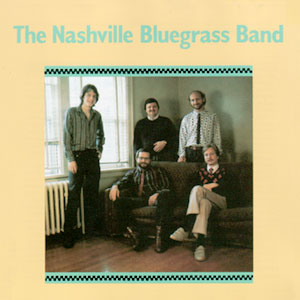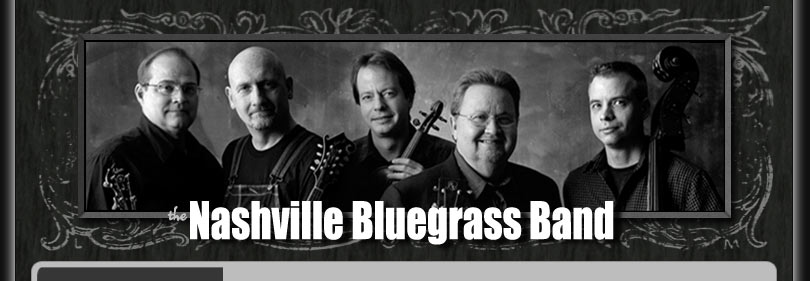
|
Produced by BELA FLECK © 1985, 1987 & 1991 Rounder Records This CD is a compilation of NBB's first two albums, My Native Home and Idle Time. The albums were digitally mastered for Rounder Records compact disc The Nashville Bluegrass Band, which includes six analog cuts from NBB's first album, My Native Home, plus nine tunes from Idle Time.
I must go down to the Station Inn, the old wooden floor, the back room and stage. And all I ask is a bluegrass band and a banjo speaking clear as a man driving nails a-way off up the holler; the smell of popcorn, the heat of the crowd, a good old country girl, and a fiddle's lonesome call to the mandolin's personal memories, and the secure sound of a tight quartet with the bass scraping the floor. I must drive out wide to East Tennessee in the sunset of an April evening with the tape player reminding me of Southern times gone by in the language of a flat top guitar; my partner's gentle footpat on the floorboards of the car. So now, tuning up in a dressing room in Johnson City to the far off whistle of The Train Carrying Jimmie Rodgers Home -- now a column of smoke on the horizon. Ladies and gentlemen, the Nashville Bluegrass Band. — John Hartford
|
|
THE NASHVILLE BLUEGRASS BAND Alan O'Bryant, banjo with special guest
|
|
Up Above My Head (1:58) |
|
Monroebillia (2:34) |
|
My Native Home (2:44) |
|
Doghouse Blues (3:07) |
|
Two Wings (2:02) |
|
Brand New Tennessee Waltz (3:48) |
|
Little Maggie (2:45) |
|
Old Timey Risin' Damp (2:17) |
|
Old Devil's Dream (2:31) |
|
The Train Carrying Jimmie Rodgers Home (3:05) |
|
play |
Angeline the Baker (1:37) |
Prodigal Son (2:28) |
|
No One But My Darlin' (2:54) |
|
All I Want Is You (2:49) |
|
Idle Time (2:03) |
|
|
OTHER LINER NOTES Every so often a band gets formed which has an immediate, sudden and lasting impact on bluegrass. During their first years they come to be thought of as “destined” and fans find themselves hoping they will “stay together.” When they do they inevitably climb to the top and share space with the other “destined” few who are their only peers. Bands which fit the mold but didn't “stay together” are ones like Boone Creek, Spectrum, and the Bluegrass Gentlemen; examples which have stayed with it and are now firmly established are Quicksilver, the Johnson Mountain Boys, and Hot Rize. All these bands had “a year” when they were recognized as “destined”. This year's band is the Nashville Bluegrass Band. Their chemistry is perfect. They combine taste with ability and balance breakdowns with gospel quartets. They are certainly destined in many ways: destined to take the bluegrass scene by storm in the tradition of the few and the rare; destined to become a standard against which other bands are compared; destined to join the ranks of those intuitively known as “premier”; and destined to make you feel like you did the first time you heard the '49 version of Foggy Mountain Breakdown, The Blue Sky Boys, Uncle Pen, the Stanleys' Little Bessie, and The Johnson Mountain Boys. Quite simply, they are the best new band going. This record shows that. I hope they stay together for a long time — long enough to fulfill their own destiny. Bluegrass will be a lot better for it. And so will my record collection. Ron Thomason, 1985 |
|
|
In many ways, Nashville is the home of bluegrass music. From the earliest days of bluegrass, the top bands made Nashville their base of operations. Partly this was because of the country music industry; also the central location made sense for touring. As years went by the bluegrass community steadily grew. A club scene sprang up where incredible combinations of musicians could be found playing bluegrass. It was in this fertile environment that Pat Enright and Alan O'Bryant met. They discovered that they had compatible tastes in music and an uncanny vocal blend. Time passed during which they worked together and separately in various groups. Occasionally they talked of putting together a group someday. It would be a band that played traditional bluegrass but would avoid the clichés and develop its own style. They wanted to have a strong vocal quartet as well. Between the work that Alan had done with Peter Rowan, John Starling and The Bluegrass Band plus Pat's work with Tasty Licks and The Dreadful Snakes (with Pat Hembree) they felt that they had a good base to build on. In mid-1984 the time was right. Two other Nashville pickers that Alan and Pat had played with in the past were instrumentally and vocally the ideal musicians for this new band. Mandolinist Mike Compton had been playing around Nashville with several goups, including banjo great Hubert Davis. Bassist Mark Hembree had worked for five years with Bill Monroe and The Bluegrass Boys. He left to help form the Nashville Bluegrass Band. This album is a culmination of years of picking and singing although the band is spanking new. The gospel singing is a special treat. The boys have developed their vocal quartet to a fine art. The picking is excellent. Alan has an unorthodox yet very musical approach to playing the banjo and Mike has taken the Monroe mandolin style and breathed new life into it. Most importantly the ensemble sound of the group is just exactly right. By now you can probably tell that I'm very excited aout these guys. I'm sure that you will be too. — Bela Fleck
|
|
|
|


